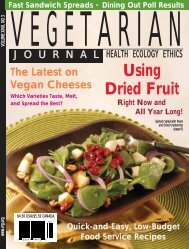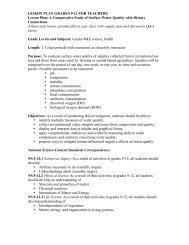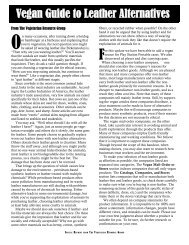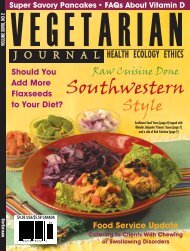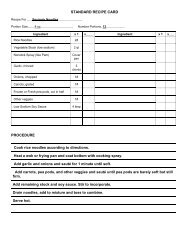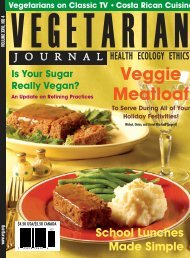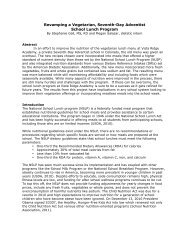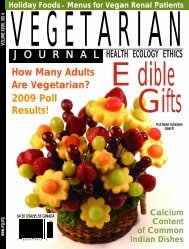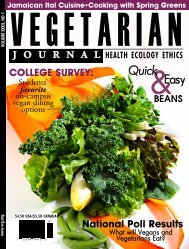Vegan Thickeners - The Vegetarian Resource Group
Vegan Thickeners - The Vegetarian Resource Group
Vegan Thickeners - The Vegetarian Resource Group
You also want an ePaper? Increase the reach of your titles
YUMPU automatically turns print PDFs into web optimized ePapers that Google loves.
een developed and is being added to some foods and<br />
used to make supplements.<br />
MUST WE GET DHA AND EPA FROM<br />
FOOD, OR CAN OUR BODIES PRODUCE<br />
THESE OMEGA-3 FATTY ACIDS? DO<br />
VEGANS GET ENOUGH DHA AND EPA?<br />
Our bodies are able to produce some DHA and EPA<br />
from alpha-linolenic acid, but we are not very efficient<br />
at this production. <strong>The</strong> rate of conversion is low in<br />
women and very low in men. 3 <strong>Vegan</strong>s who do not use<br />
DHA supplements or eat DHA-fortified foods must<br />
rely on conversion of alpha-linolenic acid to DHA and<br />
EPA. Some studies have found that blood levels of EPA<br />
and DHA are lower in vegans and vegetarians than in<br />
meat-eaters. 8,9 Whether or not these lower levels have<br />
health consequences is not known. <strong>The</strong> concentration<br />
of DHA in breastmilk from vegan women is lower than<br />
that in lacto-ovo vegetarians or non-vegetarians. 10,11<br />
Milk EPA concentration can be increased if dietary<br />
alpha-linolenic acid intake increases, but milk DHA<br />
content remains unchanged. 12<br />
HOW CAN VEGANS MAXIMIZE DHA AND<br />
EPA PRODUCTION?<br />
• Include sources of alpha-linolenic acid in your diet<br />
on a regular basis. Major sources include ground<br />
flaxseed, flaxseed oil, canola oil, soy products, hemp<br />
products, and walnuts. Green leafy vegetables, sea<br />
vegetables, and pecans also provide smaller amounts<br />
of alpha-linolenic acid. (See Table 1, right.)<br />
• Whole flaxseeds are not well digested, so the alphalinolenic<br />
acid that they contain is not available to<br />
us. If you are using flaxseeds as a source of alphalinolenic<br />
acid, be sure to use ground or milled<br />
flaxseeds or flaxseed oil.<br />
• Avoid trans fats since they interfere with EPA and<br />
DHA production. Trans fats are found in foods<br />
containing hydrogenated fat, like margarine and<br />
commercial cookies and crackers.<br />
• Use less sunflower, safflower, corn, and sesame oil<br />
and more canola and olive oil to promote DHA<br />
and EPA production. Sunflower, safflower, corn,<br />
and sesame oil are high in linoleic acid, an omega-6<br />
fatty acid that can interfere with DHA and EPA<br />
production.<br />
TABLE 1: Alpha-Linolenic<br />
Acid in Foods<br />
FOOD,<br />
SERVING SIZE<br />
ALPHA-<br />
LINOLENIC ACID<br />
(Milligrams/Serving)<br />
Avocado, ½ 125<br />
Breakfast cereal 400-1,000<br />
containing flax and/<br />
or hemp, 1 serving*<br />
Broccoli, cooked, 1 cup 190<br />
Cabbage, cooked, 1 cup 165<br />
Canola oil, 1 teaspoon 400<br />
Collards, cooked, 1 cup 180<br />
Flaxseed oil, 1 teaspoon 2,400<br />
Flaxseed, ground, 1 teaspoon* 570<br />
Hot cereal containing flax, 450<br />
1 serving*<br />
Kale, cooked, 1 cup 130<br />
Pasta containing flax, 600<br />
1 serving*<br />
Peanut butter containing 1,000<br />
flaxseed oil, 2 Tablespoons<br />
Pecans, ¼ cup 240<br />
Snack bar containing flax 400-2,100<br />
and/or hemp, 1 bar*<br />
Soybean oil, 1 teaspoon 300<br />
Soybeans, cooked, ½ cup 320-510<br />
Soymilk, 1 cup 210<br />
Soy nuts, ¼ cup 725<br />
Tempeh, 3 ounces 120<br />
Tofu, ½ cup 400<br />
Walnuts, ¼ cup 2,270-2,700<br />
Walnut oil, 1 teaspoon 470<br />
*Flaxseed should be ground or milled; otherwise little or no<br />
alpha-linolenic acid will be absorbed.<br />
Sources: Composition of Foods. USDA Nutrient Data Base<br />
for Standard Reference, Release 18, 2005, and manufacturers’<br />
information.<br />
VEGETARIAN JOURNAL Issue One 2007 23



